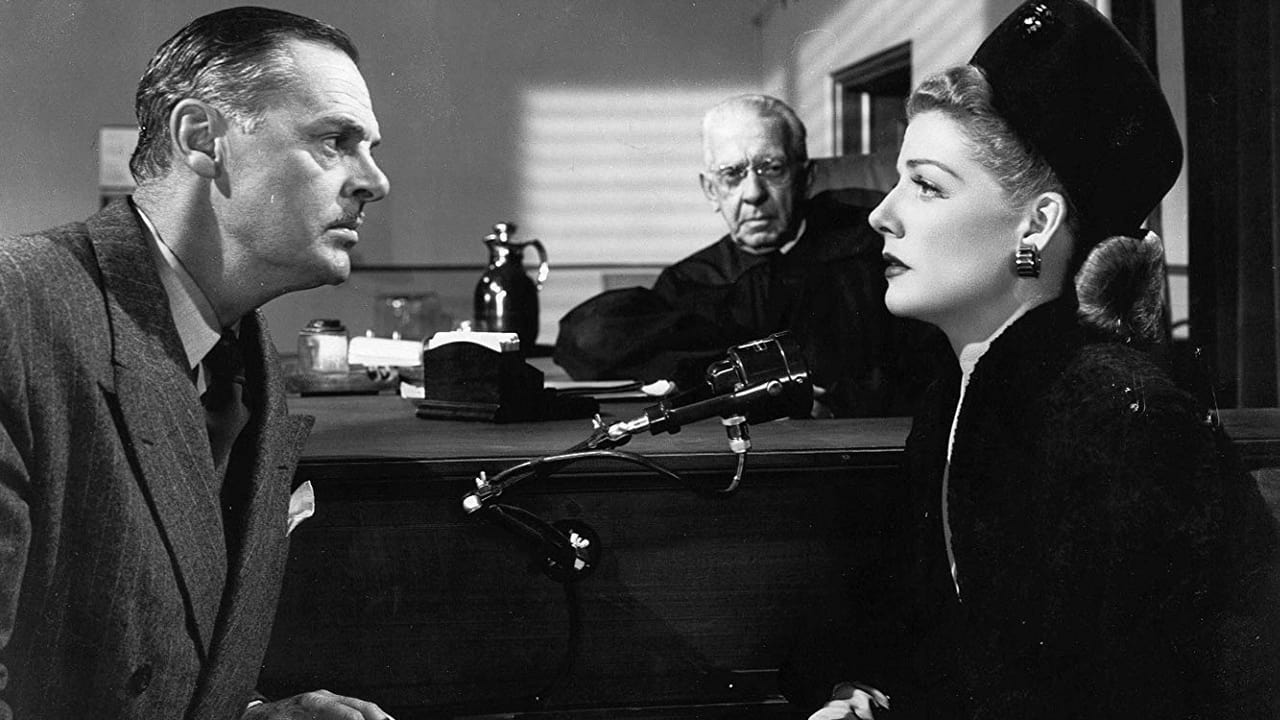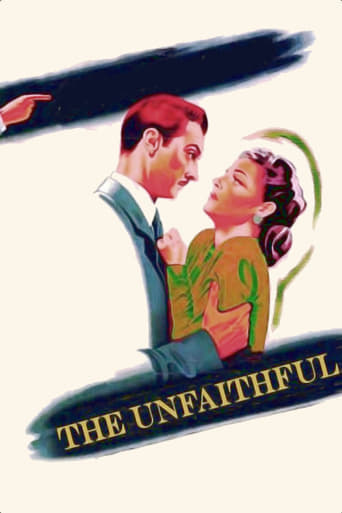SparkMore
n my opinion it was a great movie with some interesting elements, even though having some plot holes and the ending probably was just too messy and crammed together, but still fun to watch and not your casual movie that is similar to all other ones.
Rio Hayward
All of these films share one commonality, that being a kind of emotional center that humanizes a cast of monsters.
Quiet Muffin
This movie tries so hard to be funny, yet it falls flat every time. Just another example of recycled ideas repackaged with women in an attempt to appeal to a certain audience.
Phillipa
Strong acting helps the film overcome an uncertain premise and create characters that hold our attention absolutely.
classicsoncall
Ann Sheridan became my favorite classic film actress on the strength of feisty performances in films like 1938's "Angels With Dirty Faces" and 1940's "City For Conquest". Here she portrays a conflicted character who's had an affair and killed her former lover when he refuses to concede that the romance is over. Because the viewer doesn't know this when the story begins, it appears to be an open and shut case once she's arrested for murder. The intriguing story that follows contains several twists and turns that makes this a thinking person's movie, one that challenges a typical reaction that a divorce between the aggrieved parties is a foregone conclusion.The player who really makes one sit up and take notice however is Lew Ayres as attorney Larry Hannaford, lawyer and personal friend of Chris Hunter (Sheridan) and her husband Bob (Zachary Scott). Initially sympathetic to Chris's plight, he really lets her have it when he uncovers the truth of her affair, comparing her to any number of 'cheating, conniving women who parade through my office'. He eventually tempers his disdain over the situation by realizing that Chris didn't have it in her to murder a man wantonly, and so takes up her murder trial defense.Now this art shop guy Barrow (Steven Geray) was a real low down creep, wasn't he? Seeing dollar signs in it for himself when he connects the dots on newspaper headlines about the Tanner killing, he holds out for a ten thousand dollar payday by bringing in the widow Tanner (Marta Mitrovich) on his scheme. To get a good idea of Ann Sheridan's range as an actress, just catch her reaction when Barrow tells her Mrs. Tanner has the bust that Michael Tanner sculpted using her as a model. It was a foreboding look that held the threat of everything in her life about to fall apart.Actress Eve Arden also displays a side to her acting ability I haven't seen before as well. Watching her as 'Our Miss Brooks' in TV reruns back in the Fifties, I'm more familiar with her comedic side, but she proved she was capable of inserting a capital 'B' into a colorful description of her character Paula. In case you're wondering, the word rhymes with 'witch'.Ultimately this becomes a bittersweet story once Mrs. Hunter survives her murder trial and is acquitted. Then it becomes attorney Hannaford's job to try and patch up the canyon wide differences between the Hunters. The dialog that sets up what might be a successful reconciliation is the kind of writing one generally doesn't come across in pictures of the era, and works to significantly elevate the quality of the picture.
Panamint
I appreciate the overall theme and believe it has merit in its outlook on marriage. And Lew Ayers gives a near-Oscar-worthy performance. He and Eve Arden are so good, you can recommend this film just for the two of them.Plot-wise I have some problems. Yes the husband failed and pretty much set himself up for some of his marital woes. But Mrs. is a real piece of work. Maybe you understand the infidelity point generally during wartime- OK its wrong but understandable in some cases. But I believe the writers here have blown it. Her immense quantity of lies, and serial lying, lying in a sworn police statement (a legal criminal document) are just too much. Lying to police, district attorneys, the press and public. A fundamental series of lies to her own lawyer, who also is a loyal old friend who trusted her.As to her complaint about loneliness- I don't buy it because near the end she is proposing to simply go her sister's house to live. Why could she not go stay with sister during the war (could have paid those servants a retainer and traveled) or have her sister visit her in the lonely house? Couldn't she have easily afforded to bring in out-of-state family to visit her in Los Angeles? And she wasn't leading an empty life- she worked with Red Cross and numerous other organizations. I question the writer's over-assassination of her character traits. She's supposed to be a cheating wife- but she is also portrayed as the least trustworthy, chronic liar in the history of film. I don't understand how the husband and the lawyer could possibly continue any relationship with this remarkably prolific liar. This despite the fact that in many cases relationships can and do continue with cheating wives and/or husbands.If a cheating husband told this many lies to this many people post-affair, he would be placed in alimony purgatory by the system and ridden out of town on a rail. Not for the infidelity, but for extent of his lies to everyone.So I believe this film has some serious flaws as written.
edwagreen
Major change for Zachary Scott here. For a change, he is a victim, the husband of an unfaithful wife. He acts accordingly when he discovers Ann Sheridan's discretion.As always, Eve Arden is along for the ride with her snappy one-liners and her usual brilliant sarcasm. In a change for her as well, she really dramatizes it up with her scene with "cousin" Scott, telling him to go easy on Sheridan. For Scott and Arden, this was their re-teaming after "Mildred Pierce," 2 years before.Interesting line here that women left alone during World War 11 resorted to unfaithfulness. It really isn't nice when you think of it, but it works here.Note a solid supporting performance by Jerome Cowan as an aggressive district attorney.
krorie
This is not a remake of "The Letter," rather this film and "The Letter" are based on the same source, a novel by W. Somerset Maugham. Strangely, Maugham is not given credit. Since he was still alive at the time, one wonders why he didn't object. Since "The Letter," there have been other films using the same theme but not quite as obviously as "The Unfaithful," though the setting and other parts have been changed to update the story. The delightful Ann Sheridan, who never received her due recognition as an actress, plays the bored housewife who has a fling while her new husband is away at war. Like so many other beauties, Marilyn Monroe comes to mind, Sheridan was promoted as a sex kitten, The "Oomph" Girl, and her true talents were never appreciated by the Hollywood establishment. Though Sheridan is fine, three supporting players steal the show. The magnificent Lew Ayres shines as the attorney friend who tries to put the pieces together hoping to exonerate Chris Hunter (Sheridan) from suspected murder. The more he searches the less the puzzle pieces fit. Ayres received a bum rap by Hollywood big wigs when he exercised his First Amendment rights during World War II to express his pacifist views. This movie represents his efforts to be re-accepted.Zachary Scott plays against type as the husband who is caught in a murder investigation he doesn't understand. As the story unwinds, he learns more about his wife than he wants to know or to accept. When Bob Hunter (Scott) appears on the scene having been away on business, the viewer automatically thinks he is in someway involved in the killing since Scott usually played the bad guy. This film shows that Scott was a more versatile actor when given an opportunity.Then there's the elegant Eve Arden as family friend and relative, Paula. Arden has some of the best lines in the movie and does she know how to deliver them! She is catty, coy, and funny when delivering just one well-written line of dialog. When her role turns more serious toward the end of the flick, she knows how to handle that too with élan.The film is worthwhile but there are a few weaknesses. One is the introduction of characters that just wander in and then disappear without rhyme or reason. For example, at a drunken party, Paula's ex, Roger, played by Douglas Kennedy, disrupts the proceedings and has to be led away by Chris and Larry Hannaford (Lew Ayres). After such a grand spectacle, Roger is never seen or mentioned again in the movie. The viewer keeps waiting for his return thinking that just maybe he had something to do with the murder.Another weakness is running time. This film is way too long. It would have played much better in a 60+ time slot. As is, there is too much dialog. So there are long boring talky parts included to stretch the film to an almost two hour format. "The Unfaithful" is more of an effective programmer than the flashy main feature it tries to be.

